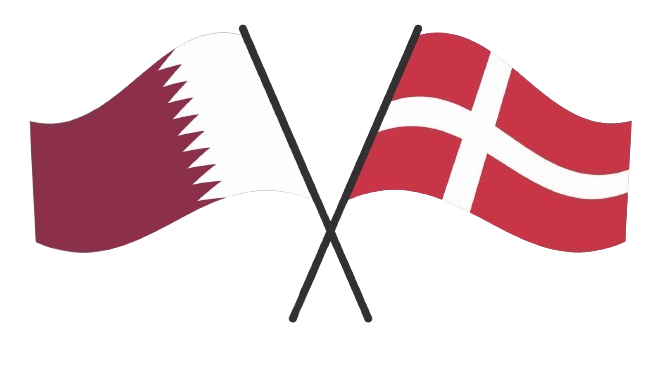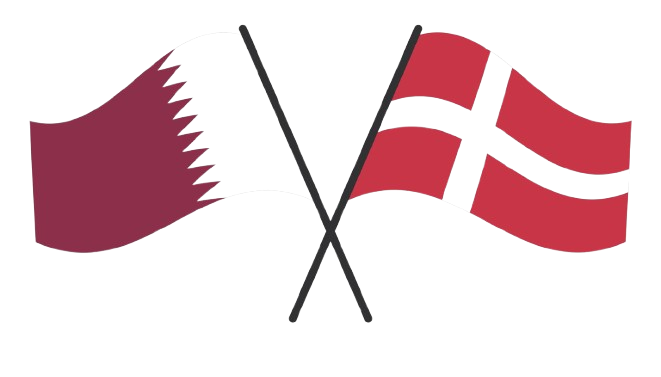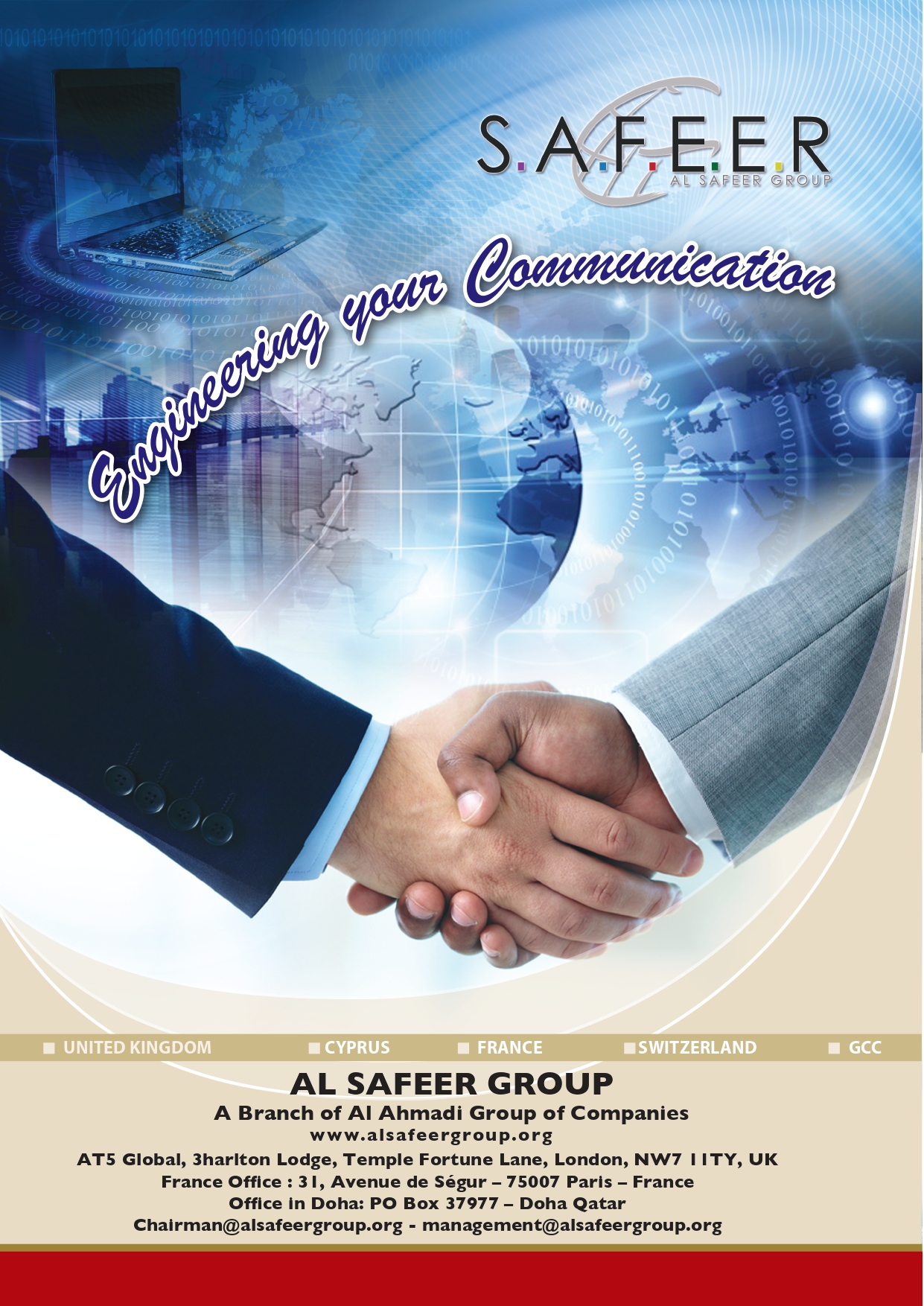
PROVISIONAL CONTENT
Beyond Fifty Years of Partnership:
Advancing Denmark – Qatar
Economic Relations with the Visionary Leadership of
H.H. Sheikh Tamim bin Hamad Al Thani, the Emir of the State of Qatar
- Foreword by His Excellency, Dr. Mutlaq Bin Majed Al Qahtani, Qatar Ambassador to Denmark
I. Introduction:
The introduction will feature an engaging video and audio presentation introducing
His Highness Sheikh Tamim bin Hamad Al Thani, Emir of the State of Qatar, and highlighting his leadership achievements. It will also focus on the extended period of Qatar-France relations, showcasing over fifty years of partnership and mutual development. The presentation will provide historical, political, and socio-economic context, emphasizing Qatar’s evolution and the strengthening of its ties with Denmark, setting the stage for an in-depth exploration of their enduring relationship.2. Achievements and Progress:
2. Achievements and Progress:
This chapter highlights Qatar’s significant achievements under the leadership of His Highness
Sheikh Tamim bin Hamad Al Thani, encompassing political reforms, economic growth, and advancements in infrastructure, sports, education, and healthcare. The emphasis will be on mega projects such as the metro, railways, industrial developments, infrastructure enhancements, roads, and stadiums, with the goal of attracting sponsorship from companies involved in these initiatives. Key interviews will feature prominent leader’s instrumental in these developments.
- H.E. Sheikh Mohammed Bin Hamad bin Qassim Al Abdullah Al Thani, Minister of Commerce and Industry
- H.E. Dr. Eng. Saad Ahmed Al Mohannadi, Chairman ASHGHAL
3. Citizens’ Welfare
This chapter examines the impact of Sheikh Tamim’s policies on the daily lives of Qatari citizens, focusing on improvements in education, healthcare, employment, security, and social justice. The analysis will explore how these initiatives have enhanced the overall well-being and quality of life in Qatar. Key interviews will feature prominent figures who have played a significant role in implementing and advancing these policies.
4. Economic Impact
This chapter delves into Qatar’s economic growth under H.H. Sheikh Tamim’s leadership, highlighting key areas such as foreign investment attraction, job creation, and improvements in economic infrastructure. It will explore how these developments have strengthened Qatar’s economy and positioned it as a significant player on the global stage. The chapter will feature interviews with prominent economic figures who have been instrumental in driving these initiatives forward.
5. Legacy and Future Prospects
This chapter assesses the legacy of the Father Emir, Sheikh Hamad bin Khalifa Al Thani,highlighting how he laid the foundation for H.H. Sheikh Tamim’s leadership. It also explores futurechallenges and opportunities, particularly in the areas of tourism and cultural promotion, as Qatar continues to build on its successes. The discussion will include key interviews with figures who have been pivotal in shaping and guiding Qatar’s strategic direction for the future.
6. Championing International Mediation and Peace
This chapter highlights Qatar’s role in championing international mediation, humanitarian aid, andeconomic development on the global stage. It emphasizes Qatar’s significant contributions toregional stability and global peace, showcasing how the country has positioned itself as a keyplayer in diplomatic efforts and conflict resolution. The chapter will explore Qatar’s initiatives thathave fostered dialogue and peaceful solutions, reinforcing its commitment to promoting harmony and cooperation among nations.
7. Qatar 2030: Vision for a Sustainable and Diverse Future
This chapter highlights Qatar’s ambitious Vision 2030, outlining the country’s commitment to sustainable development, economic diversification, and social progress. It will focus on the development of new cities, industries, and interconnected projects aimed at achieving these goals by 2030. The chapter will also encourage companies to become subcontractors in these initiatives, contributing to Qatar’s vision for a prosperous and sustainable future. Key interviews will feature leaders who are driving these transformative projects forward.
II. Denmark-Qatar Relations and Role:
- Foreword by His Excellency, Mr. Anders Bjorn Hansen, Denmark Ambassador to Qatar
This chapter will explore the impact of His Highness Sheikh Tameem on Qatar’s relations with Denmark, covering strategic partnerships, trade agreements, diplomatic initiatives, and contributions to global causes. It will highlight the international recognition received by Qatar and the Emir.
II.1. Economic and Political Relations
The economic relations between Denmark and Qatar are characterized by diverse trade exchanges, mutual investments, and collaborative projects across various sectors. Here are the key aspects of their economic relationship:
1. Trade Volume and Growth
a. Steady Growth: The trade volume between Denmark and Qatar has been growing, reflecting strengthening economic ties.
b. Strategic Partnership: Denmark is an important trading partner for Qatar within the European Union, providing access to Northern European markets.
2. Major Exports from Qatar to Denmark
a. Liquefied Natural Gas (LNG): Qatar is a significant supplier of LNG to Denmark, contributing to the country’s energy needs and supporting its transition to cleaner energy sources.
b. Petrochemicals: Qatar exports various petrochemical products to Denmark for use in different industrial applications.
c. Crude Oil: Crude oil and related products form a part of Qatar’s exports to Denmark, supporting the country’s energy requirements.
3. Major Exports from Denmark to Qatar
a. Pharmaceuticals and Medical Equipment: Denmark exports a wide range of pharmaceutical products and medical equipment to Qatar, contributing to the country’s healthcare sector.
b. Industrial Machinery: Danish companies supply advanced machinery and equipment for various industries in Qatar, including construction and manufacturing.
c. Food Products: Denmark exports high-quality dairy products, meat, and processed foods to Qatar, supporting the local food supply chain.
d. Renewable Energy Technologies: Danish firms provide renewable energy solutions, such as wind turbines and solar panels, aligning with Qatar’s sustainability goals.
4. Investment and Joint Ventures
a. Mutual Investments: Both countries have significant investments in each other’s economies. Danish companies are involved in various sectors in Qatar, including energy, construction, and healthcare.
b. Joint Ventures: There are several joint ventures between Qatari and Danish companies, particularly in the fields of renewable energy, pharmaceuticals, and infrastructure.
5. Energy Sector Collaboration
a. LNG Supply: The long-term agreements for LNG supply from Qatar to Denmark are crucial for Denmark’s energy security.
b. Renewable Energy Projects: Collaboration on renewable energy projects, such as wind and solar power, is a key aspect of their economic relationship.
6. Healthcare and Pharmaceuticals
a. Medical Infrastructure: Danish investments in Qatar’s healthcare sector include the development of medical infrastructure and the supply of advanced medical technologies.
b. Pharmaceutical Companies: Danish pharmaceutical companies, such as Novo Nordisk, are active in the Qatari market, providing essential medications and healthcare products.
7. Technology and Innovation
a. Tech Startups: Danish technology firms and startups are increasingly investing in Qatar’s tech ecosystem, particularly in sectors like fintech, health tech, and smart city solutions.
b. Research and Development: Collaborative R&D initiatives between Danish and Qatari institutions are fostering innovation, particularly in fields like sustainable technologies and healthcare.
8. Infrastructure and Construction
a. Danish Expertise: Danish companies contribute significantly to Qatar’s infrastructure projects, leveraging their expertise in sustainable construction and urban development.
b. Construction Projects: Danish firms are involved in major construction and infrastructure projects in Qatar, including those related to the FIFA World Cup 2022 and Qatar National Vision 2030.
9. Food Security and Agriculture
a. Agri-Tech Collaboration: Denmark, known for its advanced agricultural technologies, collaborates with Qatar to enhance food security through sustainable agricultural practices and technologies.
b. Food Products: High-quality Danish food products are widely consumed in Qatar, contributing to the country’s food security.
10. Cultural and Educational Exchanges
a. Cultural Initiatives: Both countries engage in cultural exchanges, promoting mutual understanding and appreciation of each other’s heritage and traditions.
b. Educational Partnerships: Danish universities and educational institutions have partnerships with Qatari counterparts, leading to student exchanges and collaborative research projects.
11. Trade Facilitation and Agreements
a. Bilateral Agreements: Several bilateral trade agreements facilitate smooth trade operations, reducing barriers and enhancing economic cooperation.
b. Chambers of Commerce: The Qatar Chamber of Commerce and Industry and the Danish Chamber of Commerce play pivotal roles in promoting trade and resolving business-related issues.
12. Sustainability and Environmental Initiatives
a. Green Technologies: Denmark’s expertise in green technologies and sustainability practices is highly valued in Qatar, contributing to the country’s environmental goals.
b. Sustainable Development Projects: Joint initiatives in sustainable development projects are helping both countries meet their climate and environmental targets.
Conclusion
The economic relations between Denmark and Qatar are marked by robust trade, significant investments, and strategic collaborations across various sectors. Both countries benefit from this relationship, which supports economic growth, innovation, and sustainable development. The ongoing partnerships and mutual investments continue to strengthen the economic ties between Denmark and Qatar, fostering long-term prosperity and cooperation.
13. Qatari Investments in Denmark
Qatari investments in Denmark reflect a strategic interest in various sectors, including real estate, financial services, renewable energy, and technology. These investments are part of Qatar’s broader strategy to diversify its portfolio and strengthen economic ties with European countries. Here are some key areas and examples of Qatari investments in Denmark:
Real Estate
a. Prime Properties: Qatari investors have shown interest in high-value real estate properties in major Danish cities, such as Copenhagen. These investments include commercial buildings, hotels, and residential complexes.
b. Qatar Investment Authority (QIA): The QIA has been active in acquiring prestigious properties and developing real estate projects, contributing to Denmark’s urban development.
Financial Services
a. Banking and Investment: Qatari banks and financial institutions have invested in Danish financial markets, supporting various financial services and economic activities.
b. Joint Ventures: Collaborations between Qatari and Danish financial institutions to offer a range of banking and investment products and services.
Renewable Energy
a. Green Energy Projects: Qatar has invested in Denmark’s renewable energy sector, particularly in wind and solar power projects. These investments align with Qatar’s commitment to sustainability and renewable energy development.
b. Nebras Power: This Qatari energy company has stakes in renewable energy projects in Denmark, including wind farms, which are a significant part of Denmark’s energy infrastructure.
Technology and Innovation
a. Tech Startups: Qatari investors have been involved in funding Danish technology startups, particularly those focused on fintech, health tech, and clean tech.
b. Research and Development: Collaborative R&D projects between Qatari institutions and Danish universities or tech firms to foster innovation and technological advancements.
Healthcare and Pharmaceuticals
a. Healthcare Investments: Qatari entities have invested in Danish healthcare companies and infrastructure, leveraging Denmark’s expertise in healthcare and pharmaceuticals.
b. Pharmaceutical Collaborations: Partnerships between Qatari healthcare institutions and Danish pharmaceutical companies to enhance healthcare services and drug availability in Qatar.
Agriculture and Food Security
a. Agri-Tech Initiatives: Investment in Danish agricultural technology and practices to enhance food security in Qatar. This includes collaborations in sustainable agriculture and food production.
b. Food Products: Investment in Danish food production and processing companies to secure a steady supply of high-quality food products for the Qatari market.
Infrastructure and Construction
a. Urban Development Projects: Qatari investments in Danish infrastructure projects, including construction and urban development, support Denmark’s economic growth and development.
b. Smart City Initiatives: Investment in smart city technologies and infrastructure, leveraging Danish expertise in sustainable urban planning and development.
Hospitality and Tourism
a. Hotel Acquisitions: Investment in the Danish hospitality sector, including the acquisition and development of luxury hotels and resorts.
b. Tourism Partnerships: Collaborations to promote tourism between Qatar and Denmark, enhancing cultural exchange and economic benefits from the tourism sector.
Notable Qatari Entities Involved:
a. Qatar Investment Authority (QIA): The sovereign wealth fund of Qatar, actively investing in various sectors in Denmark.
b. Nebras Power: Focuses on energy investments, including renewable energy projects in Denmark.
c. Qatar National Bank (QNB): Provides financial services and invests in Danish financial markets.
d. Hassad Food: Engages in agricultural investments to enhance food security for Qatar.
Conclusion
Qatari investments in Denmark are diverse and strategic, spanning multiple sectors that contribute to the economic growth and development of both countries. These investments not only strengthen economic ties between Qatar and Denmark but also promote mutual benefits through collaborative projects and partnerships. As both nations continue to explore new opportunities for cooperation, the scope of Qatari investments in Denmark is likely to expand further, fostering long-term economic resilience and sustainability.
15. Denmark Investments in Qatar
Danish investments in Qatar reflect strong economic ties and a commitment to mutual growth across various sectors, including energy, healthcare, infrastructure, and technology. Here are the key areas and examples of Danish investments in Qatar:
a. Energy Sector
a. Renewable Energy: Danish companies are actively involved in Qatar’s renewable energy projects, particularly in the development of solar and wind energy. This aligns with Qatar’s vision for sustainable energy.
b. Energy Services: Danish firms provide advanced energy services and technologies to enhance Qatar’s energy efficiency and management.
b. Healthcare and Pharmaceuticals
a. Medical Equipment and Technology: Danish healthcare companies supply cutting-edge medical equipment and technology to Qatari hospitals and clinics, improving the healthcare infrastructure.
b. Pharmaceuticals: Danish pharmaceutical companies, such as Novo Nordisk, have a significant presence in Qatar, providing essential medications and healthcare solutions for diabetes and other chronic conditions.
c. Infrastructure and Construction
a. Construction Projects: Danish construction companies participate in major infrastructure projects in Qatar, including those related to the FIFA World Cup 2022 and Qatar National Vision 2030. These projects involve building stadiums, roads, and other key infrastructure.
b. Engineering Services: Danish firms offer engineering consultancy and management services, contributing to the efficient execution of infrastructure projects in Qatar.
d. Technology and Innovation
a. Tech Startups and IT Services: Danish technology firms are investing in Qatar’s burgeoning tech scene, particularly in sectors like fintech, health tech, and smart city solutions. These investments support Qatar’s ambition to become a regional tech hub.
b. Research and Development: Collaborative R&D initiatives between Danish and Qatari institutions foster innovation in fields like sustainable technologies and advanced engineering.
e. Food Security and Agriculture
a. Agri-Tech Solutions: Denmark, known for its advanced agricultural technologies, collaborates with Qatar to enhance food security through sustainable agricultural practices. Danish companies provide innovative solutions for greenhouse farming, hydroponics, and other sustainable farming methods.
b. Food Products: Danish firms export high-quality dairy products and other food items to Qatar, contributing to the country’s food supply.
f. Maritime and Shipping
a. Maritime Services: Danish companies provide advanced maritime technology and services, supporting Qatar’s shipping and port infrastructure.
b. Shipping Logistics: Investments in logistics and supply chain management enhance the efficiency of Qatar’s maritime operations.
g. Environmental Services and Sustainability
a. Waste Management: Danish firms offer expertise in waste management and recycling, supporting Qatar’s efforts to improve its environmental sustainability.
b. Water Treatment: Companies from Denmark provide advanced water treatment technologies and services, addressing water scarcity and ensuring sustainable water use in Qatar.
h. Consulting and Professional Services
a. Management Consulting: Danish consulting firms offer strategic and operational consulting services to Qatari businesses, helping them optimize their operations and achieve their growth objectives.
b. Legal and Financial Services: Danish firms provide legal, financial, and advisory services to support business operations and investments in Qatar.
i. Key Danish Companies in Qatar
a. Novo Nordisk: A leading pharmaceutical company specializing in diabetes care, with a strong presence in Qatar.
b. Grundfos: Supplies advanced water pump solutions and technologies, contributing to Qatar’s water management systems.
c. Vestas: Engages in renewable energy projects, particularly in wind energy, supporting Qatar’s sustainability initiatives.
d. Maersk: Provides shipping and logistics services, enhancing the efficiency of Qatar’s maritime and supply chain operations.
e. FLSmidth: Offers engineering and equipment solutions for the cement and mining industries in Qatar.
f. Ramboll: Provides engineering, design, and consultancy services for various infrastructure projects in Qatar.
g. COWI: Offers consultancy services in engineering, environmental science, and economics, contributing to sustainable development projects in Qatar.\
Chapter Conclusion
Danish investments in Qatar span a wide range of sectors, demonstrating a commitment to supporting Qatar’s development goals and fostering mutual economic growth. These investments not only strengthen the bilateral economic relationship but also promote knowledge transfer, technological innovation, and sustainable practices. As Qatar continues to diversify its economy and pursue ambitious development projects, the role of Danish investments is likely to grow, contributing to long-term prosperity and collaboration between the two nations.
III. Conclusion:
The conclusion will encapsulate the achievements, impact, and legacy of His Highness Sheikh Tamim bin Hamad Al Thani, highlighting his transformative influence on Qatar’s development.
It will underscore how his leadership has positioned Qatar as a thriving nation with a strong economy, a vibrant society, and robust international partnerships, including its strategic ties with Japan. The conclusion will also emphasize the enduring benefits of these developments, setting the stage for a prosperous and collaborative future for Qatar and its global partners.
IV. VISIT QATAR & QATAR TOURISM VIDEO
The final section will promote Qatar as a unique destination where cultural authenticity meets modernity. It will describe Qatar’s rich history, natural beauty, and modern attractions, highlighting the nation’s tourism offerings and commitment to service excellence.
An interview with Engineer Abdulaziz Ali Al-Mawlawi, CEO of Visit Qatar, will provide insights into Qatar’s tourism strategy and plans.
This structured and detailed outline provides a comprehensive view of Qatar’s transformation under His Highness Sheikh Tameem bin Hamad Al Thani’s leadership, showcasing the country’s achievements, impact, and future aspirations.

CONTACT
MAIN LINKS
The Official Publication of the State of Qatar Embassy Celebrating 50 Years of Excellence and Achievements of the State of Qatar
Embassy of the State of Qatar
Borweg 7
2597 LR ‘S-Gravenhage
The Hague – Netherlands
+31704166666
Al Safeer Group, the Official & Exclusive Delegate
Office in Doha: PO Box 37977 – Doha, Qatar / Tel: +974 5555 6254
Email: chairman@alsafeergroup.org
Head Off.: AT5 Global, 3 Charlton Lodge, Temple Fortune Lane, London, NW11 7TY,
Email: management@alsafeergroup.org
UK / Tel: +44 203 76 91 779

